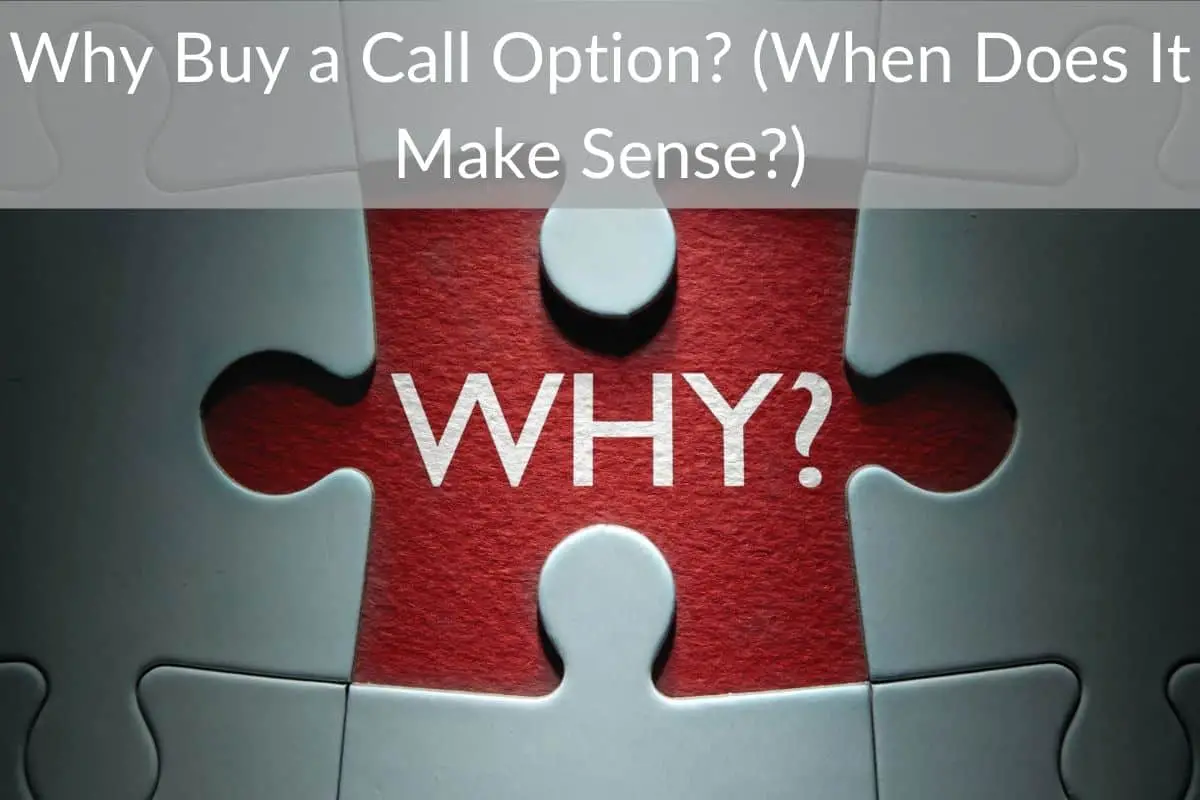Table of Contents
*This post may contain affiliate links. As an Amazon Associate we earn from qualifying purchases.
Call options are an investment strategy that allows you to buy the right (have the option) to buy a security like a stock at a certain price. You pay a premium now for a chance to profit more in the future.
But why should you buy a call option, and when does it make sense to do so?
You should buy a call option when you expect the price of a security to rise within a certain time frame and you want to have the right to buy the security at a low price. Buying a call instead of the shares of the stock allow you to leverage your investment and achieve higher gains (if you are right).
If you can buy a security for lower than the current price, you already have made money on your investment, which is what call options let you do.
Let’s say for example you believe shares of ABC company are going to skyrocket in the next two months and the shares of the stock are currently trading at $10. If you have $1,000 to invest you could buy 100 shares of the stock or you could (likely) buy 10 option contacts (if the premium for the call option is $1).
With the call option you now control 1,000 shares of the stock rather than 100 for the same amount of money meaning if you are correct and the stock skyrockets (or even jumps a modest amount) you will make a serious profit.
If ABC’s stock goes from $10 to $20 if you hold the shares you just turned $1,000 into $2,000 (so a $1,000 profit). However, if you purchased those call options they are now worth $10 ($1,000 per contract) which means you turned $1,000 into $10,000!
That leverage is why many people love buying call options.
In this article I will explain some of the benefits and disadvantages of buying call options so you can understand when they are a smart investment and when you should reconsider buying call options.
Benefits of Buying Call Options
There are many benefits to buying call options, as long as you have a strategy for doing so. First, if you buy the right call options, you can exercise them for a high return.
You will break even on a call option when the current trading price of the security is equal to the sum of the strike price and the premium you paid for the call. When the current trading price of the security is higher than the sum of the strike price and the premium you paid for the call, you made a profit on the call, and the difference between the two is your overall gain.
The gains you can earn from buying a call option are essentially unlimited because the security price can increase infinitely. However, the price you pay for the security is limited to the strike price plus the call premium.
Another benefit of buying call options is that there is a large variety of them for sale. If you do not mind spending more money on a call, you can get one for a security trading close to the strike price. A call like this has a higher chance of getting in the money before it expires, so you have a better chance of profiting on the option.
You can also find very cheap options if you think the value of a security will increase significantly. The cheapest call options have a strike price that is much higher than the current trading price, so there is a smaller chance that they will have value before they expire.
However, if you can buy these calls successfully, you can profit a lot, as you will not have spent very much on the call’s premium.
Downsides of Buying Call Options
One of the downsides of buying call options is that you can lose all the money you spent on them if the security price does not rise as you expect it to or doesn’t do it before the call expires. If the security price does not increase above the strike price, you will not be able to exercise the option, and it will expire with no value to you.
The loss you can face when you buy a call option is limited to the premium. Additionally, the only way to make some or all of the money back is if the call option is in the money when you exercise it or if you sell it before expiry when the stock (or the market) has moved or increased in volatility.
Furthermore, you need to remember that the call seller is selling the call because they do not believe the security will trade above the strike price before the option expires.
If they are correct, they will keep the premium you paid for the call, and you will lose your money because the call expires worthless. Only one person (either the buyer or the seller) can be right about the security price, and the other will lose money on the call.
Finally, options are a risky investment. If you are unfamiliar with options trading, you will not have much success trading them, and you will likely lose the money you invested.
Options depend on the security they are for, so you need to analyze the security and the details of the option, including the expiration date, the strike price, and the option’s premium. Then, you can decide if a specific option is worth buying or if you are better off finding another option or not buying one at all.
Given the many pros and cons of buying call options, knowing what to do may seem challenging. One good option is to learn more about options trading before you take the leap, so you can be confident you’re making the right choice.
Check out the next section for books you can use to learn more about options trading.
Learn More About Buying Options
Here are some books from I recommend for all beginners who want to learn more about the basics of all options. This includes call options and how you can get started buying options.
- OPTIONS TRADING: 2 Books In 1: Crash Course + Day Trading: This is a great book for beginners as it will teach you all the basics of options trading. This includes what it is, how you can get started buying options, and how to day trade options. You will also learn how to analyze options to choose the best ones to buy and avoid common mistakes that beginners make when trading.
- Understanding Put and Call Options: While this book focuses on both put and call options, you can benefit from the call option sections if you are interested in buying calls. You will learn how to profit from buying options or buying them to back up other securities you own or are trading.
Final Thoughts
Call options are a good investment when you expect the price of a stock or other security to increase in a short period of time, and you want to have the option to buy shares for cheaper than they currently trade for.
In exchange for paying a small premium, you can exercise the option anytime before it expires.
If you are successful, you will make a gain on your stock purchase. But, if you are wrong, you lose the premium you paid for the call option, and it expires with no value.

